Roadwarden review – Rich text detail, world-building and player choices pave the way for an excellent narrative RPG
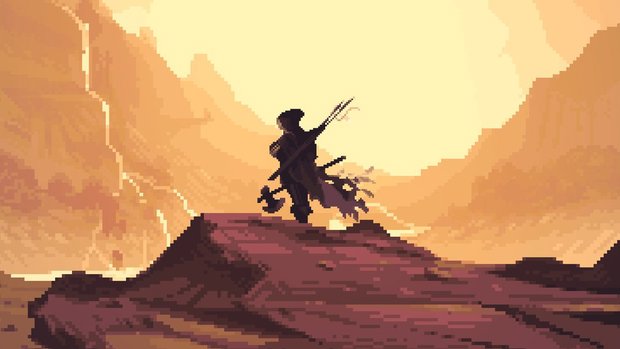
- 0 Comments
The fantasy genre is often celebrated for providing a means of escaping into another world, but that’s far from its only purpose; it’s also a way to look slantwise at the world we have, and to try to make some sense of it. Following a Chosen One on an epic journey can be fun, of course, but sometimes you want a story about a more familiar sort of person: someone trying to survive in a society that cares little for them, and whose most immediate challenge isn’t saving the world but simply surviving in it. Not everybody can save the world, after all; that sort of thing requires many people working bit by bit from the ground up and with life’s many moving pieces whirling around them, and it may take lifetimes. That’s the kind of story Moral Anxiety Studio seeks to tell in Roadwarden, an elaborately immersive text-driven narrative RPG that tasks players with exploring a deep and dynamic fantasy setting and deciding the best way to be part of it.
You begin Roadwarden having just entered the titular profession, whose duties are somewhere between a ranger’s, a sheriff’s, and a courier’s. You are journeying from the great city of Hovlavan to patrol an uncharted and currently nameless peninsula, home to bandits, necromancers, and savage beasts. Those who live there are scattered in small settlements that serve mostly to shelter them from the elements. Your task, having been hired by a powerful merchants’ guild, is to scout the area, discover what you can, and pave the way, if possible, for the guild’s expansion into the territory.
Your character begins as the blankest of slates: you select only a name, a class (fighter, mage, or scholar) and a personal goal, which gives you a secondary objective during your travels. Other than that, you have no backstory save what you select for yourself in dialogue with other characters; you are, essentially, whoever you say. The same thing goes for the world at large; it’s established early on that Hovlavan and its environs are emerging from a long and devastating war, but the finer details of how that’s unfolded are for you to decide.
The obstacles you face will be the same whichever class you choose, but each comes with different means to overcome them. All roadwardens carry an ax, for instance, but a fighter will have a better chance to use it and other weapons effectively; a mage can rely on spells for healing and offense rather than arrows and scarce, costly potions; and a scholar can draw on their knowledge of the world to access more dialogue options and deeper descriptions of what they see. The differences can be subtle, but they’re significant.
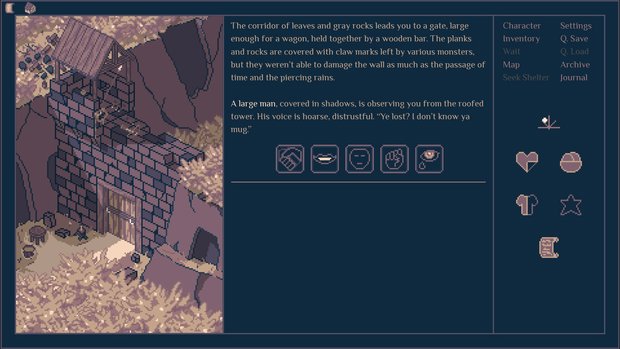
Your main objective—to scout and observe—is purposefully broad, and you’re given a time limit of forty in-game days to pursue it. (There’s also a casual mode with no limit, and a hard mode that shrinks your deadline to a month.) You have enough freedom to explore that the game world too is essentially what you make of it; you can choose which leads to follow and what quests interest you most, though your deadline means you likely won’t experience everything in one playthrough.
Many variables affect your free time on the peninsula: bad weather means traveling takes longer, for instance, and road conditions can either help or hinder you. (As a roadwarden, one of your jobs is to maintain trails; choosing to do so can substantially reduce travel time, though of course that means less time to spend elsewhere.) The wilderness is so dangerous that travel by night is impossible, and as the season wears on you’ll find dusk falls sooner and sooner. You’ll have to think like an explorer to plan your days, consulting the world map and considering the displayed travel times between locations before setting out. If the route from point A to point B is particularly arduous, you might want to try scouting uncharted territory for a better one (as long as the effort doesn’t kill you).
You can die in Roadwarden, and you probably will; the peninsula is a hazardous place, and you won’t be prepared for everything it throws at you. Gameplay-wise it’s not a huge inconvenience—you can always restart whatever encounter killed you—but fleeing when you can’t prevail by force or guile can mean sacrificing precious time and resources.
Four stats govern your wellbeing, and it’s unusual to leave any encounter with all of them intact. Only your health will kill you if it falls to zero, but the other three—nourishment (how long until you need food), armor durability (how well your cuirass protects you), and appearance (how beat-up you look after your travels)—affect many aspects of how you play. You’ll have to monitor them all and maintain them mindfully as you travel.
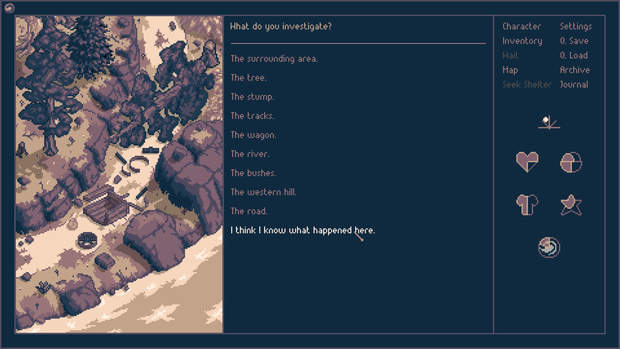
All this makes Roadwarden sound more combat-focused than the average adventure game, but this is deceptive; there’s less emphasis on fighting here than even in Quest for Glory and its various imitators. You’ll certainly find yourself in plenty of dangerous, high-adrenaline situations—the world is teeming with unsavory critters—but more often than not the key to survival lies more in what you know than in what you’re swinging. Paying attention to the locals when they talk can yield knowledge about monsters, their habitats, and their likes and dislikes; preparing accordingly may mean the difference between life and death. (Most of what you learn in conversation is automatically recorded in your warden’s journal, which you can open any time from the menu, along with quest details and conversation transcripts.)
Sometimes the solution is as simple as discovering what scent a certain creature hates and selecting the prompt to spread it once you’ve snagged a sample, but you’ll still usually have to put two and two together on your own. In many situations a text parser will appear with the instruction to type what you’d like to do, use, or say, and success is often a question of both knowing what might work and having found or gone to look for it beforehand. It’s totally possible, then, to stumble into fights you can’t win because you haven’t found the right item yet, but there are no dead ends to worry about; as ever, death simply zaps you back to the start of the encounter with the option to run away.
None of which is to say that you can’t ever win the day through force of arms. Infrequent prompts come with the image of a die, meaning victory or failure is down to chance. Your stats, knowledge and preparedness can help even the odds, but top-shelf equipment is the great equalizer. (You’re free to avoid combat wherever you please, of course, but as with every choice, this can mean missing certain pathways, quests, and encounters.) Since roadwardens live on what they earn from performing odd jobs, it’s in your best interest to pursue side quests where they’re available; tailors, armorers, innkeepers, and alchemists all ply their trade in the outposts and villages, and you’ll need their services to thrive.
Sometimes this means buying better weapons, but more often what you’ll want most is mundane: a roast chicken to keep your belly full, or soap and a toothbrush to stay clean and presentable. Your nourishment and appearance stats play an outsize role in Roadwarden, and require just as much attention as your health. Sleeping on an empty stomach, for instance, won’t recover lost health points, and a starving warden may not observe or speak as well as a well-fed one. Likewise, you’ll be treated differently if you show up well-groomed in a clean outfit than bruised and ragged-looking.
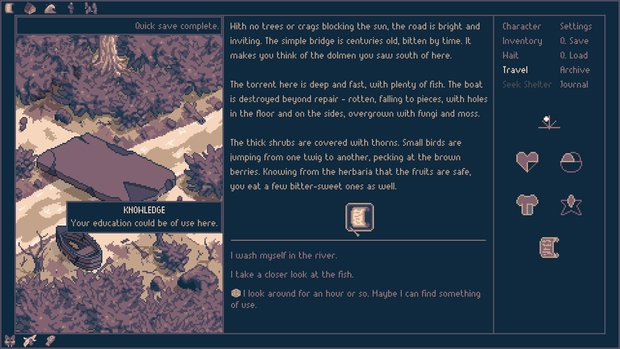
A great deal of thought, planning and care clearly went into the game’s various systems. You explore the peninsula using your world map, traveling to locales you’ve found by clicking their icons and exploring new areas by following an arrow into uncharted darkness. Hovering over an icon tells you how long it takes to reach under present conditions. New points of interest show up on the map as you find them, and the more you travel, the more connections you’re liable to uncover between distant points. Exploring can be its own reward: there’s a wealth of hard-to-find encounters and secret locations squirreled away in the map’s darkest corners. If you’re ever stuck in a given quest, odds are the missing piece lies somewhere you’ve never been.
Each location is rich with its own flavor and personality, so that you’ll find yourself torn between staying in one place and doing all you can there or venturing off to see and learn more about the world. You’re allowed to spend as much or as little time as you’d like in a given spot, but the more you do in any one place, the more you’ll influence its trajectory and its future. Well-to-do Howler’s Dell, for instance, led by the industrious but flinty mayor Thais, is suspicious of outsiders but hopeful of expanding in the coming seasons. How you ingratiate yourself there will have far-reaching impacts on your mission for the merchant’s guild. On the other hand is Creeks, a little village of struggling but determined farmers; you might help them grow and progress toward becoming a regional hub or let them stay the course they’ve set for themselves.
There’s no “right” way to proceed, so you’re free to act how you see fit with each community. There isn’t a main quest per se, other than to uncover as much of the peninsula as you can. A major throughline is the mystery of your predecessor’s sudden disappearance, and getting everything in place to follow his trail can take most of the game’s forty-day timeline. Still, you don’t have to follow this thread to the end if you don’t want to, and are free to finish the game whenever you like; all you need to do is tell a certain character you’re ready to leave, and you’ll head back to report to your superiors. (This can lead to a bit of an anticlimax if you haven’t wrapped everything up by day forty, as there’s no imposed endpoint or denouement to whatever storylines you might be midway through. The day simply arrives and it’s time to go.)
Roadwarden’s game world is big and changes constantly, and its narration is so rich with detail that it’s easy to forget it’s basically a text adventure. While a simple, monochromatic, and mostly static pixel art image of your current location fills the right third of each screen, accompanied by an atmospheric synth soundtrack that helps establish the mood, almost all of the game’s scene-setting occurs through dialogue and narration. You’ll never get a look at an NPC, a monster, or your own character, but it’s all described so well and in such depth that I can summon up a clear image of each area and individual in my head even now. The characterization is rich, and even those people who appear at first to be based on well-worn archetypes—the necromancer-priest Orentius, for example, or the bandit leader Glaucia—display hidden layers the more time you spend with them.
Such a complex, dynamic setting means Roadwarden has to juggle a staggering number of variables, and while it manages admirably in the long run, it’s not without the occasional immersion-breaking stumble. You’ll accumulate a great deal of information in your journal as you explore the peninsula, with an impressively thorough bestiary you’ll fill in through encounters and conversations with experts. There’s so much there, though, that the game doesn’t always manage to keep it straight. You’ll hear terms used in ways that contradict the information in your journal; terms like dragon, dragonling, and saurian are sometimes used interchangeably in the same encounter, for instance, though the bestiary assigns them to three very different critters. The result is an off-putting impression that the narrator is having more trouble visualizing the scene than you are.
It’s easy, too, to get tripped up by the peninsular dialect, which peppers much of the (unvoiced) dialogue. It’s not impenetrable, seeming much like an accented form of English—“han’t” for “haven’t,” “nae” for “no,” “lil” for “little,” and so on—but the game neither defines nor makes a note of it, so that it’s up to the player to both realize that the odd spellings are intentional and to parse the less obvious contractions themselves. With the amount of information available in your journal, it’s strange that there’s no entry setting out or remarking upon the peninsula dwellers’ mode of speech. You will get the hang of it, but it may take longer than it was meant to.
Final Verdict
In the end, though, any quibbles are all secondary. The meat of Roadwarden comes from exploring its deep, richly developed setting and discovering the way its many moving pieces interact to influence and change that world. There’s more here than can be experienced in a single playthrough—mine took eighteen hours, and I left with some mysteries unsolved—and the number of decisions to be made on both a macro and micro level mean it could take many replays to discover all of its secrets. There’s so much to do, so many thorny questions it poses about the world and a single person’s place in it, and such nuance and complexity to its approach that I found myself thinking about it long after I’d finished playing, and considering in my spare time the implications of certain outcomes and how events might have gone if I’d done things differently. Roadwarden is many things—a text adventure, a fantasy story, an exploration of a singular setting—but in all of them, it’s a resounding success.
Hot take
Roadwarden is a highly compelling, vividly realized text-based expedition into a dynamic fantasy setting, with a deep and layered story that allows players to experience as much or as little as they choose while deciding what kind of role they want to play in its deceptively vast world.
Pros
- A relatably grounded fantasy setting full of depth and complexity
- Dynamic story that unfolds according to the player’s priorities and decisions
- Satisfying gameplay that encourages critical and strategic thinking
- Remarkable amount of replay value
Cons
- Time limit and absence of a “main quest” means the story can trail off awkwardly under some circumstances
- Worldbuilding is sometimes inconsistent and hard to parse
Will played Roadwarden on PC using a review code provided by the game's publisher.

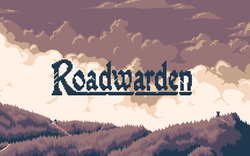
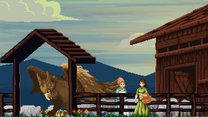

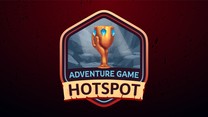




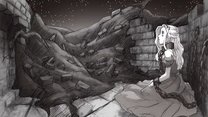
0 Comments
Want to join the discussion? Leave a comment as guest, sign in or register in our forums.
Leave a comment